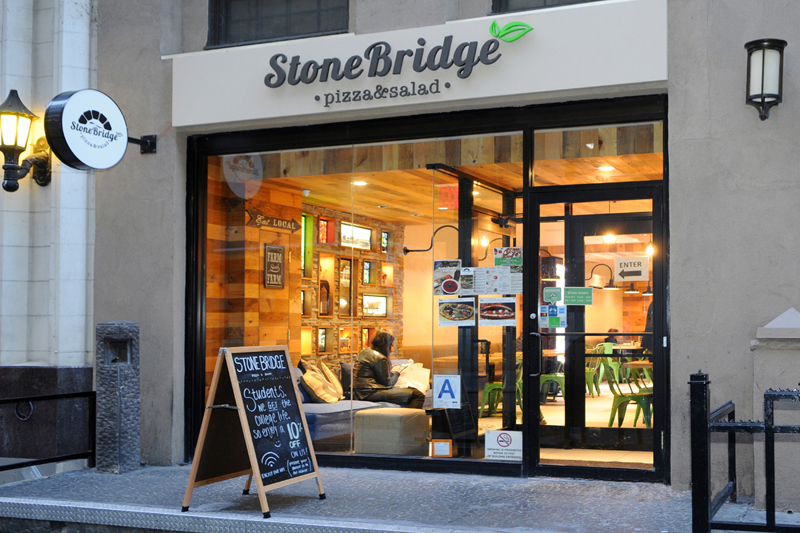After a career on Wall Street, Enrique Mendez and his business partner dabbled in growing hydroponic tomatoes, which worked out surprisingly well and led them toward an intensely ambitious goal: creating a new restaurant to offer the finest and most sustainable pizza in New York City. Two years after opening a brick-and-mortar store in Midtown, and just weeks after opening a second location within the first Zuul Kitchens facility in SoHo, Mendez has cultivated strong feelings about big-city landlords, which he characterized as predators feeding off the revenue of fledgling restaurateurs. He has concerns as well about national delivery providers.
It cost more than a million dollars to get the first Stone Bridge Pizza & Salad up and running on 41st Street just east of Bryant Park. Finding an acceptable location with non-deal-breaker rents took a year and a half. Mendez said such a long, brutal process isn’t uncommon in a city where—in his view—landlords often charge rents so high that they hobble upstart restaurant balance sheets from day one.
He added that national delivery providers are having a similarly negative effect on restaurants desperately seeking growth and new customers. With a backdrop of delivery brands soaking up massive investments before turning profits, Mendez sees flashes of the tech bubble bursting shortly after getting his MBA from Stanford’s Graduate School of Business in the early 2000s.
Now with two locations up and running, and fawning Yelp reviews, he wants to help independent restaurant operators adapt to shifting consumer behavior without giving a sizable portion of their profits away in the process. To him, that means seeking out ghost kitchen, delivery and driver partners seeking a true partnership, rather than those with the most name recognition.
“That value chain is highly inefficient the way it’s operating, and there has to be a better way,” Mendez said. “There’s been an evolution of ideas to try and improve that situation from the operators’ standpoint,” namely ghost kitchens that are run in partnership with restaurant clients, rather than what he called “a real estate play.”
Even though many aspects of the current restaurant scene are distressing, Mendez has a genuine passion for cooking pizza the right way with long dough fermentation times, no added sugar in the crust, locally sourced and sustainable ingredients, and an overarching goal to minimize the carbon footprint of his growing operation.
Analytical by design, Mendez isn’t just focused on delivery providers and landlords. He’s looking at every step of the delivery process, and investing in heated elements inside proprietary bags and elevating delivered pizzas off the container to prevent steam from sogging-out the brand’s thin-crust pies.
Stone Bridge works uses catering and delivery providers for their customer bases, rather than carrying out the actual deliveries that is handled by in-house drivers. The ghost location in Zuul’s SoHo facility has only been open for a few weeks, but initial experience suggests it could make $800,000 to $1 million in revenue once it hits its stride.
With such a dramatically smaller space within the ghost kitchen, that would be an impressive return on investment given startup costs being just a fraction of the cost of building out another traditional restaurant. For comparison, the brick-and-mortar store is on track to exceed $1.5 million in sales for 2019. With rising wages and other cost increases, the company is considering outsourcing delivery to Relay Delivery’s couriers.
Being such a new restaurant brand, the availability of ghost kitchens has been a major change to the company’s ramp-up plans, especially compared to restarting the process of finding another standalone space. With such a high density of office workers in Manhattan, Stone Bridge sees catering as another major growth channel, underscored by receiving office orders as high as $4,000 at once.
Mendez feels a carefully curated list of complementary, diverse restaurant brands under the roof of a single ghost kitchen is a huge benefit for customers trying to satisfy diverse tastes. With delivery becoming more ubiquitous, that attention to choosing the right restaurant brands and then working closely with them to ensure success will put a higher priority on quality and selection in the coming years.
“Nobody orders from thousands of restaurants; I order from five,” Mendez said of the consumer benefit of multi-brand ghost facilities. “If a ghost kitchen can give you a choice of best-in-class cuisines and your entire family can order different foods from different operators … you benefit from being part of an expanded menu and the synergies that are attained by being in a single location.”


